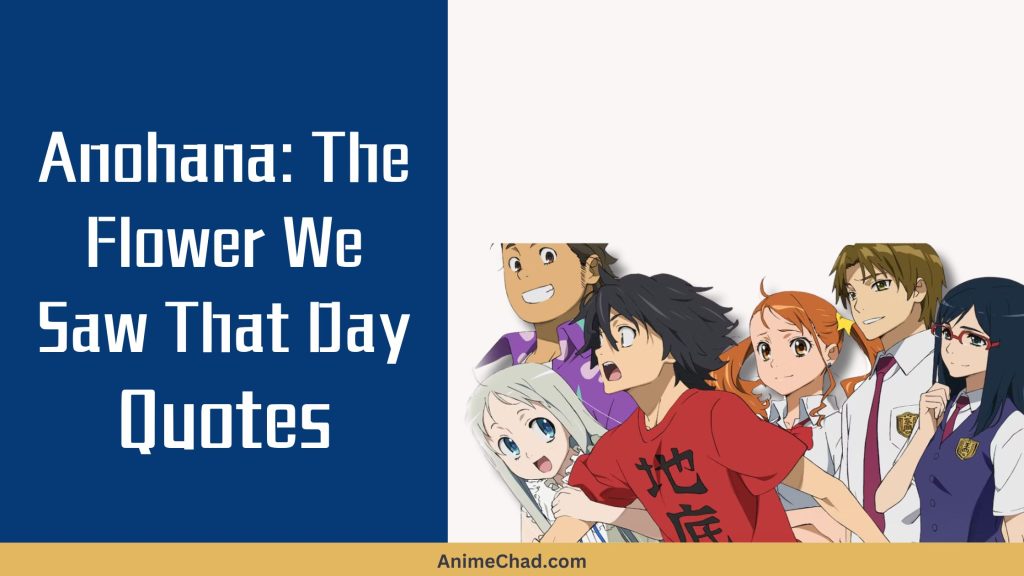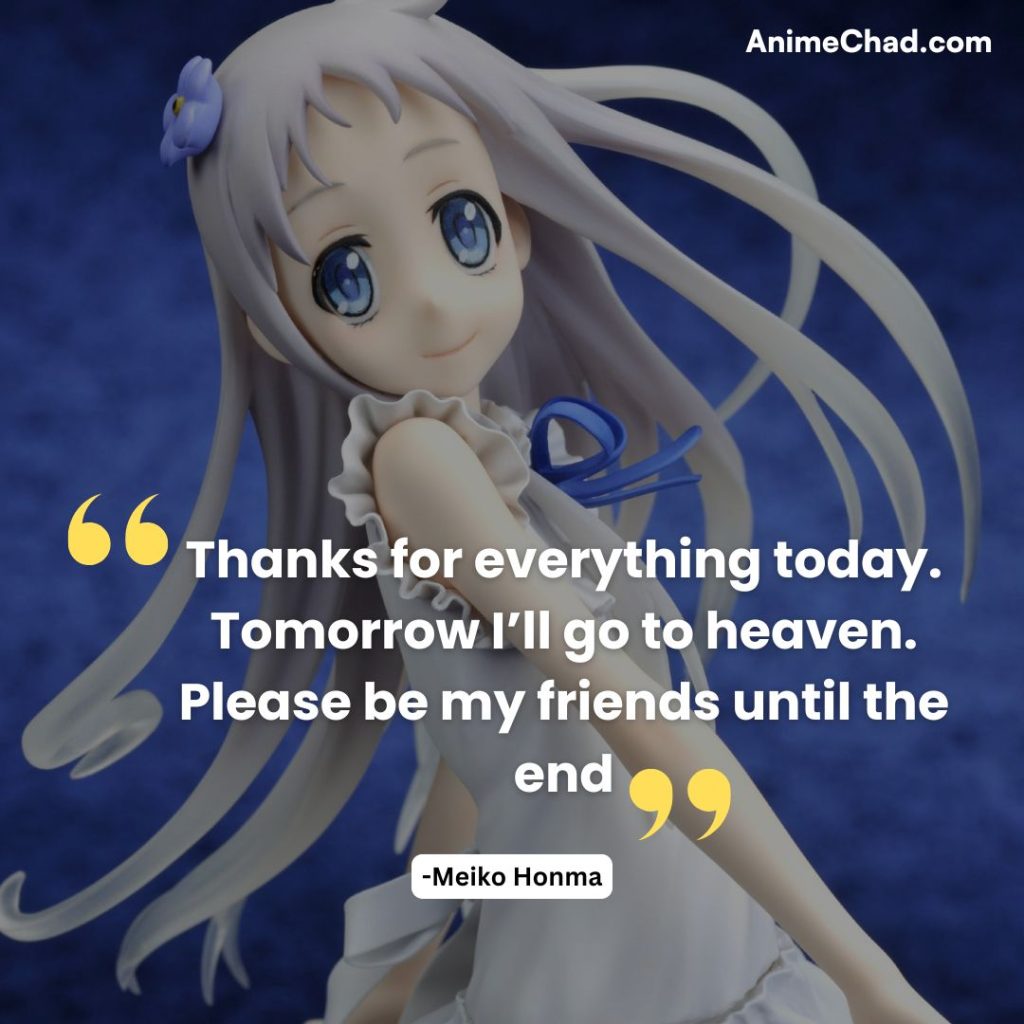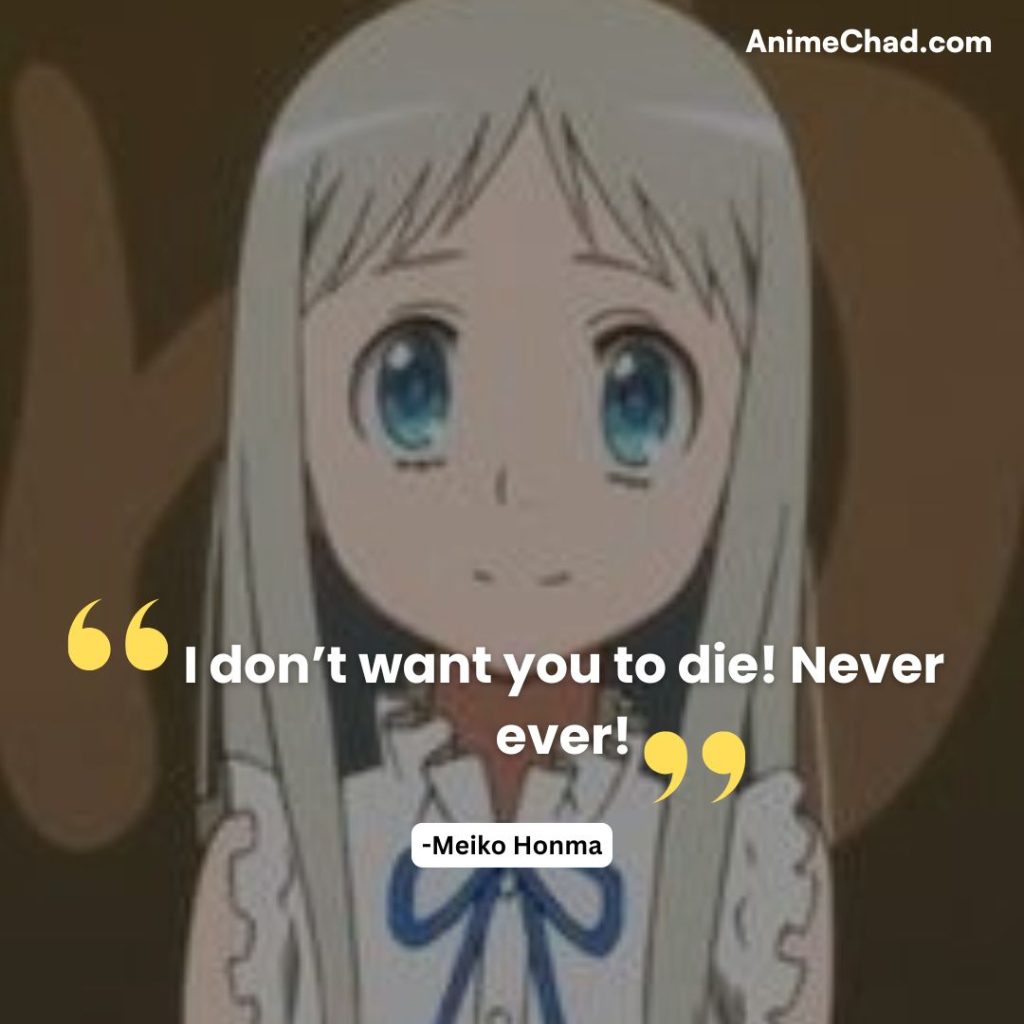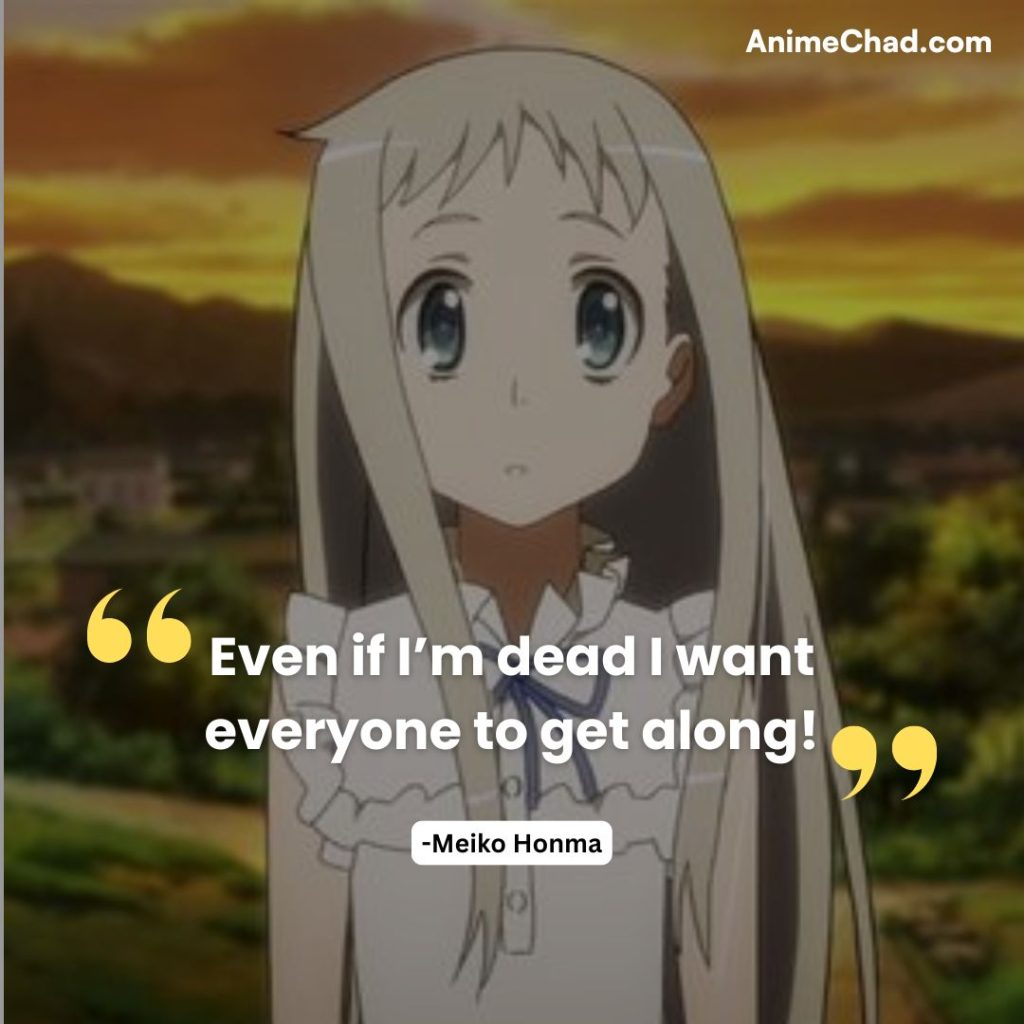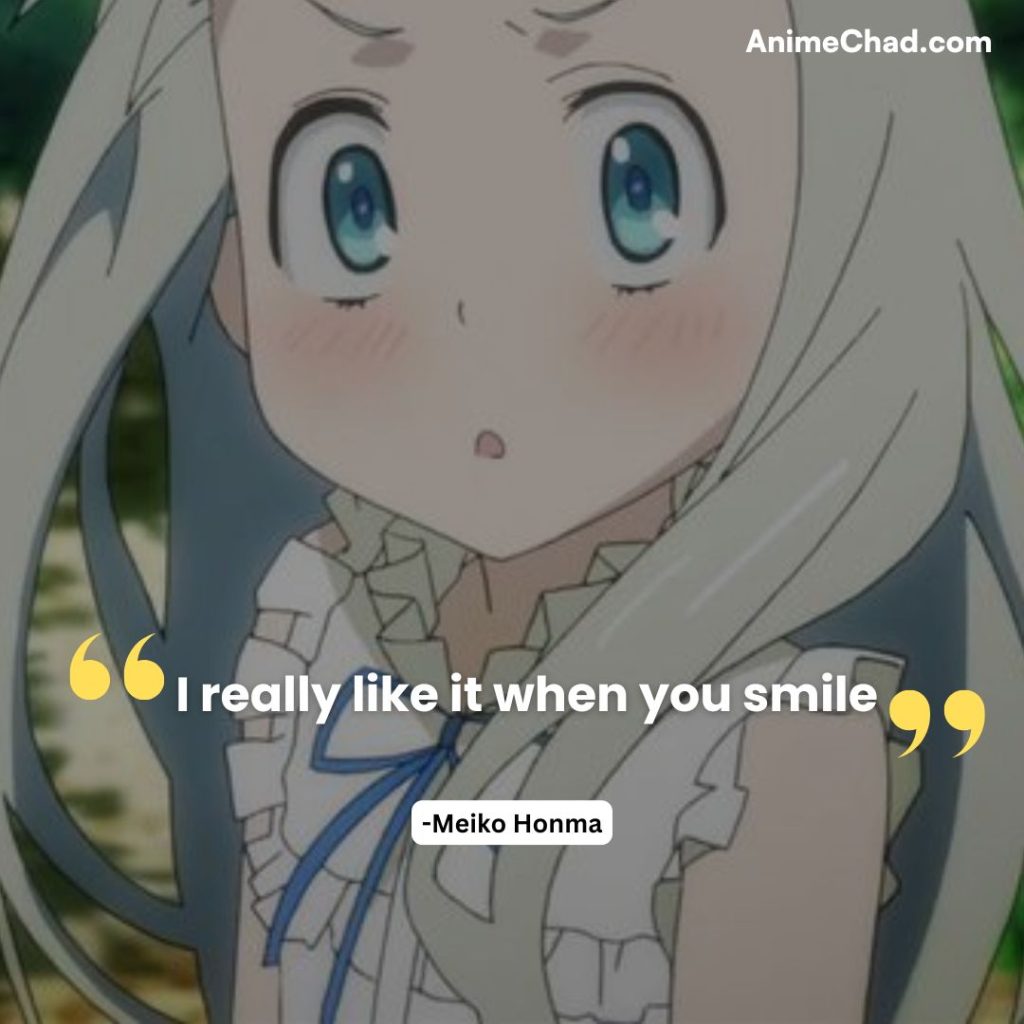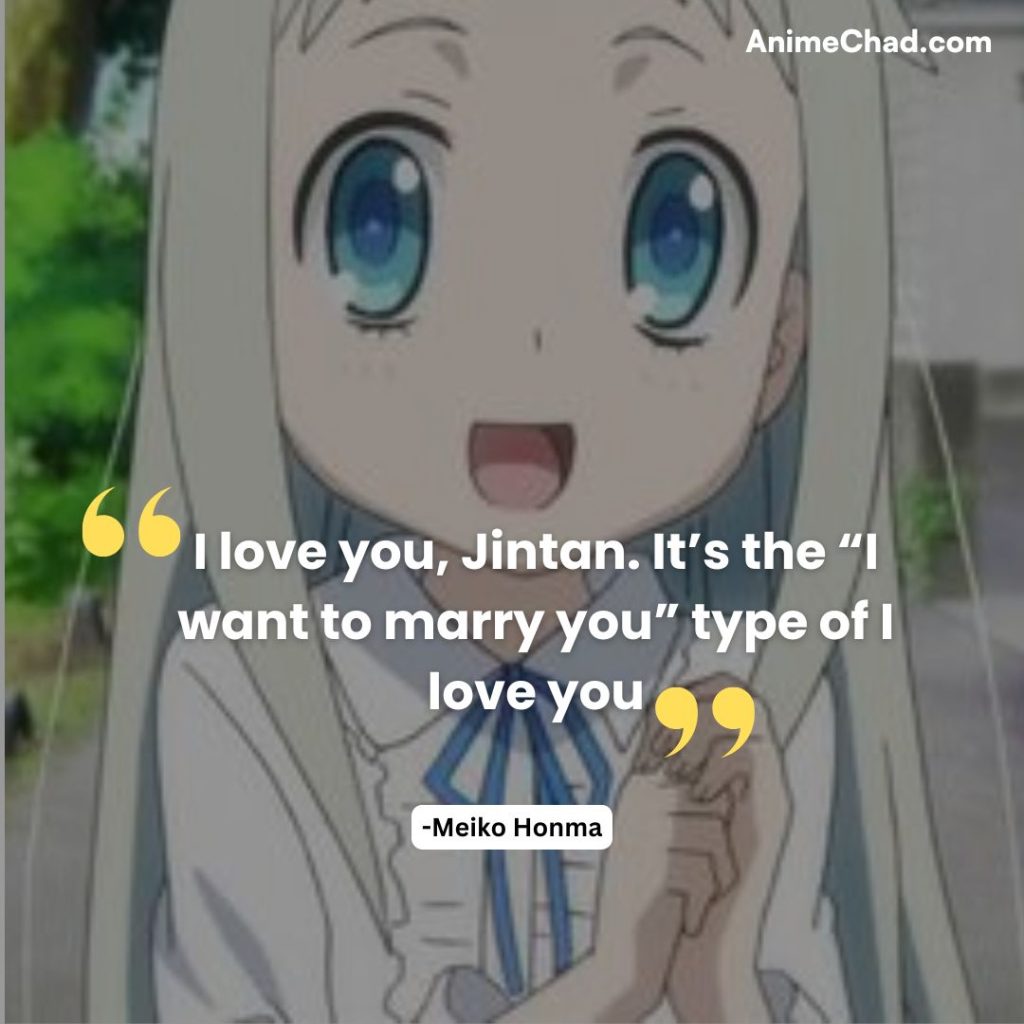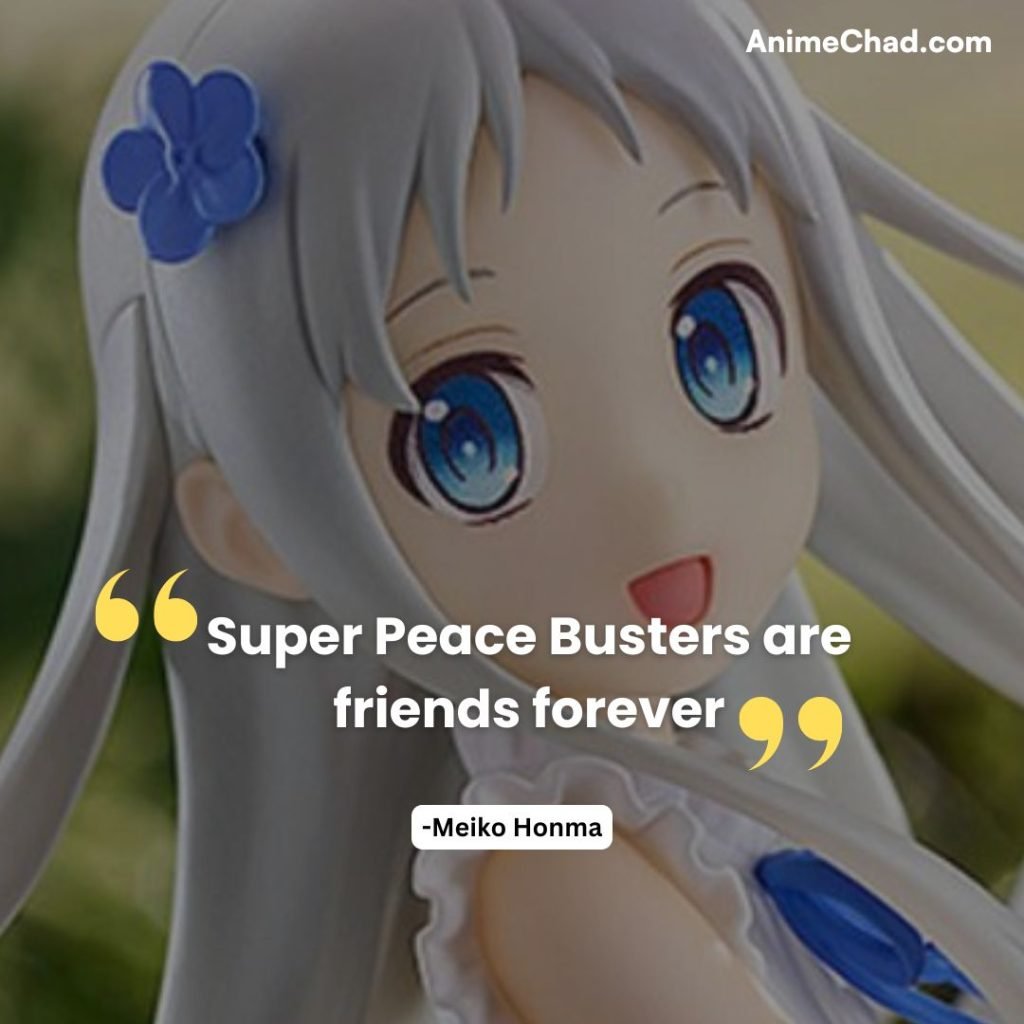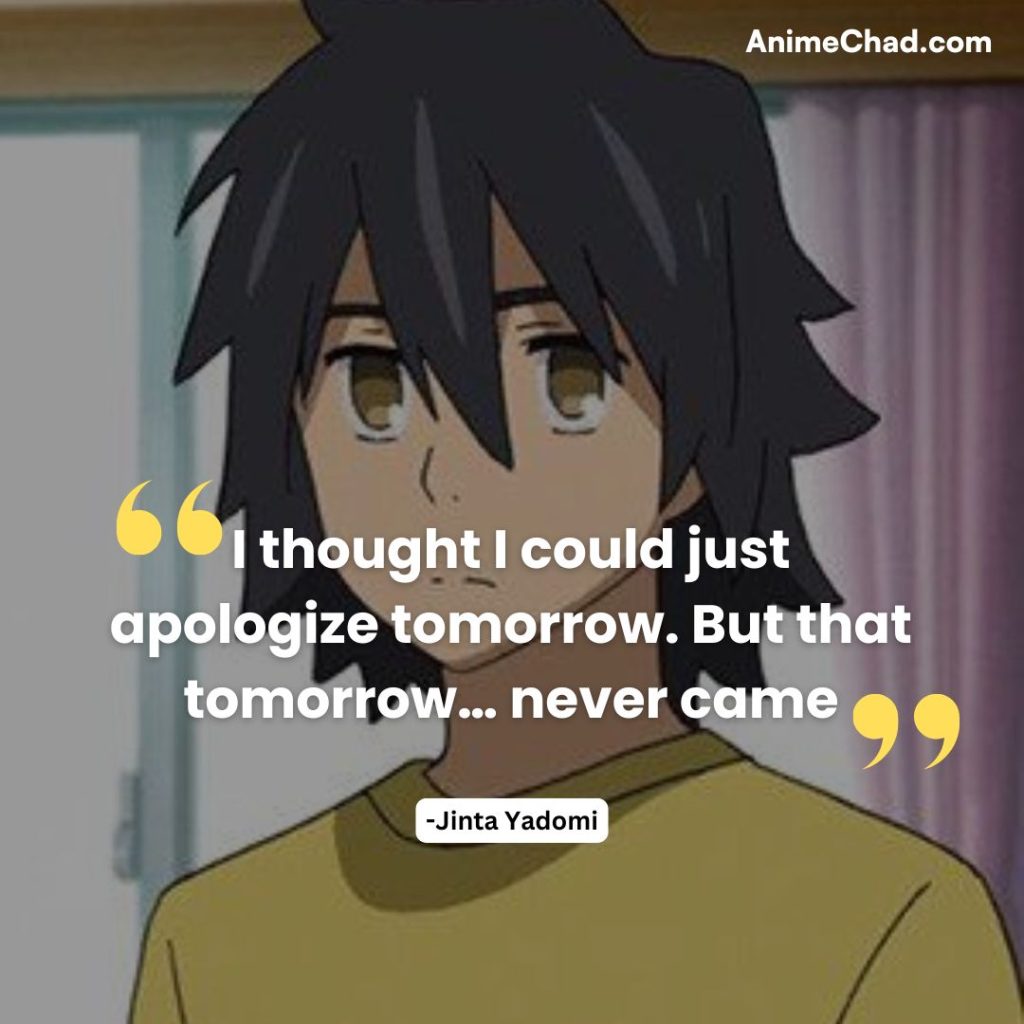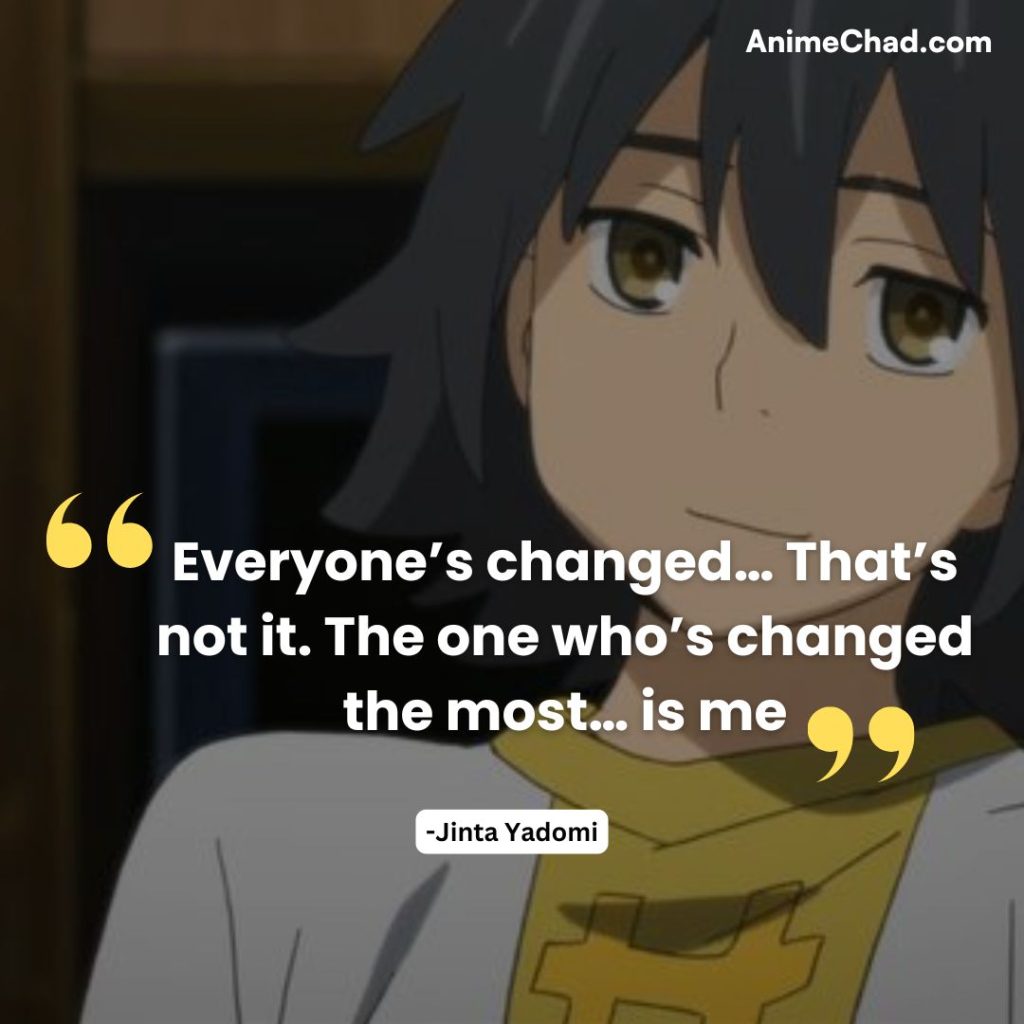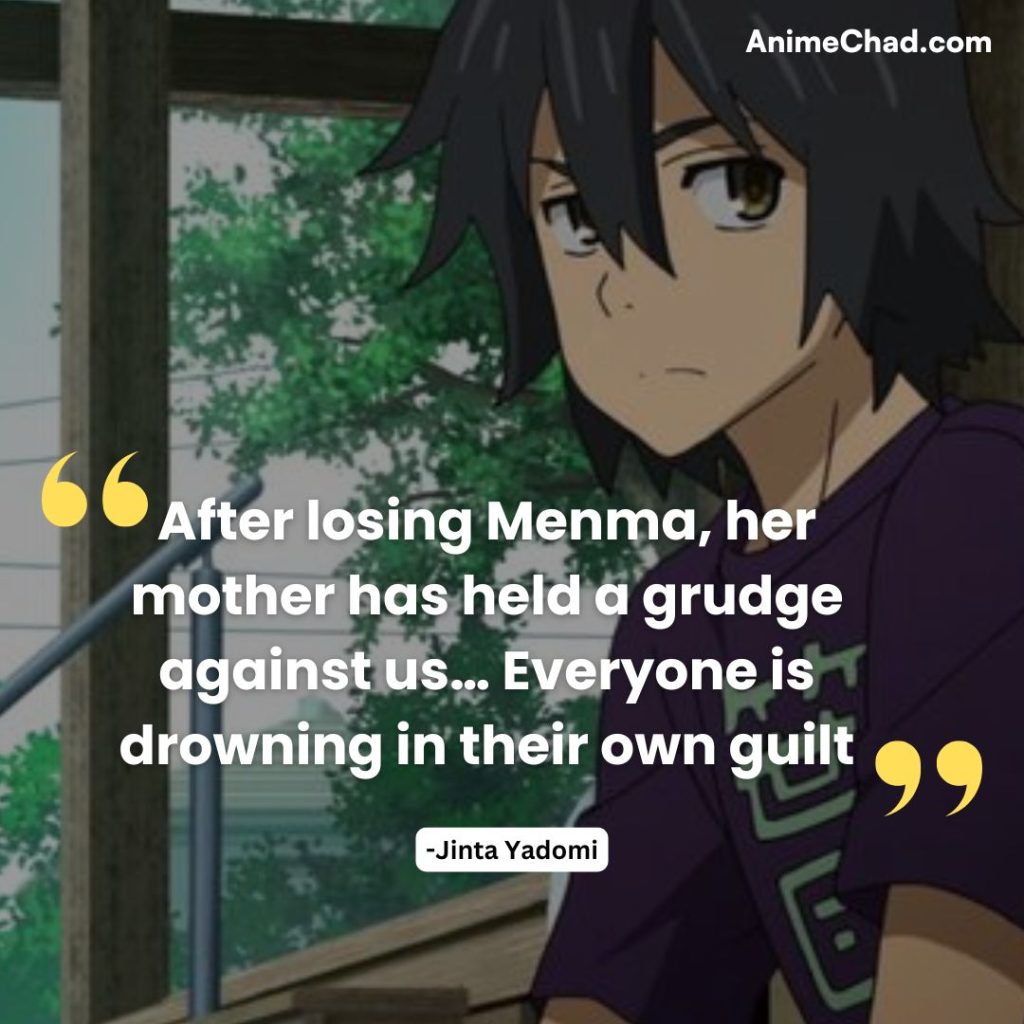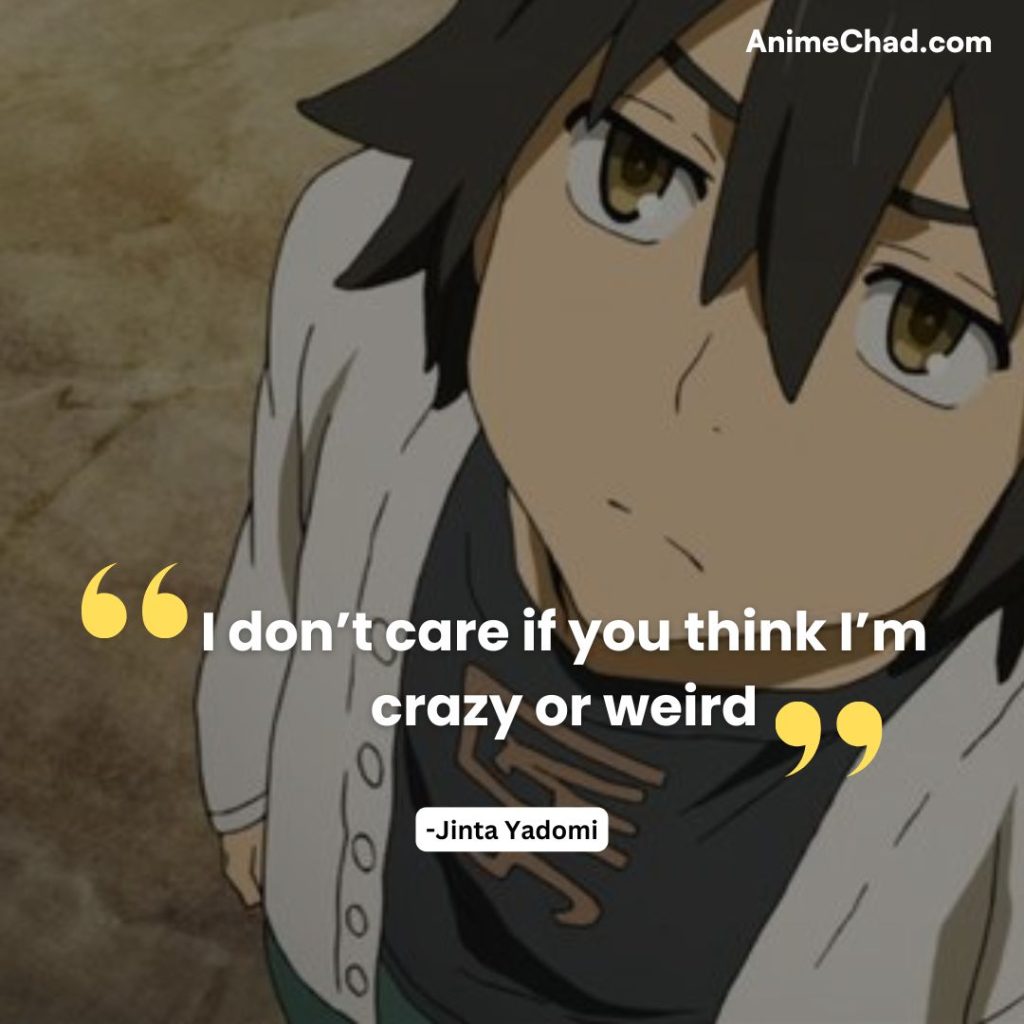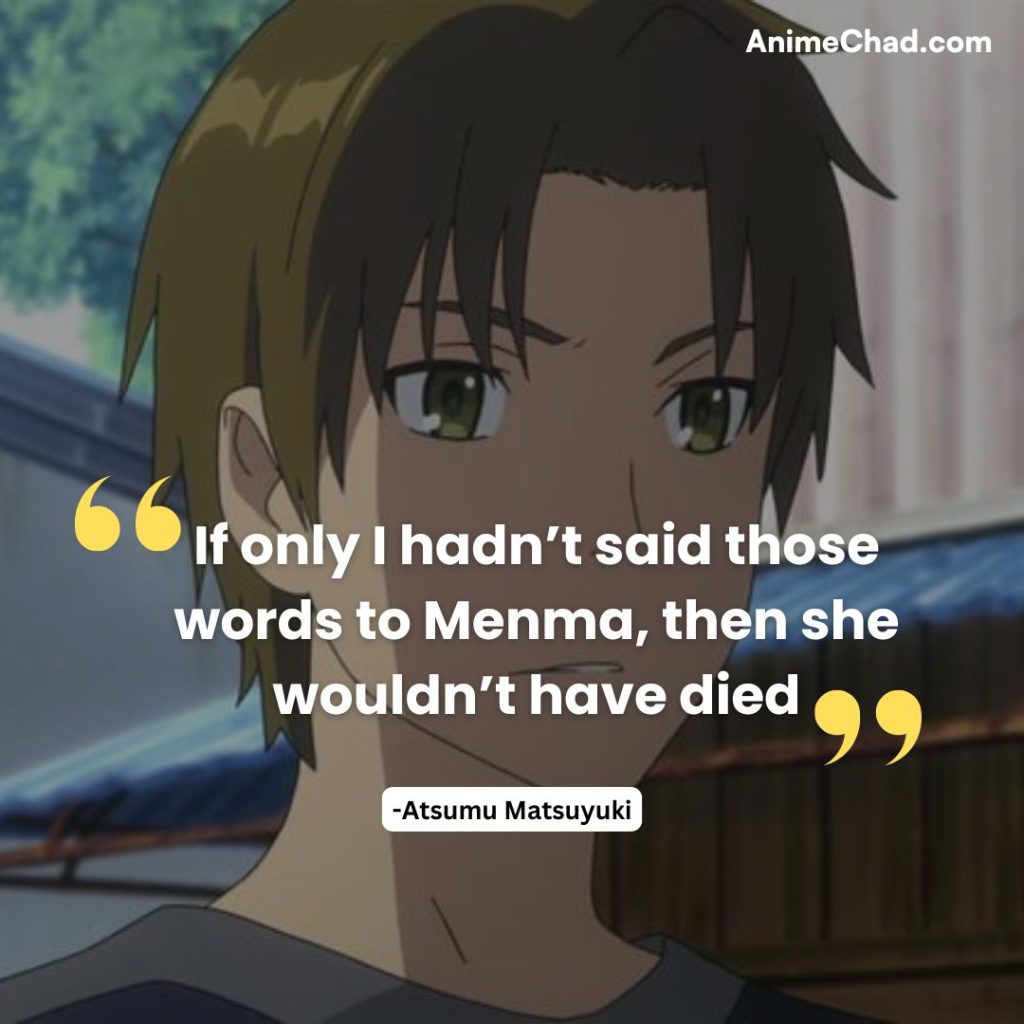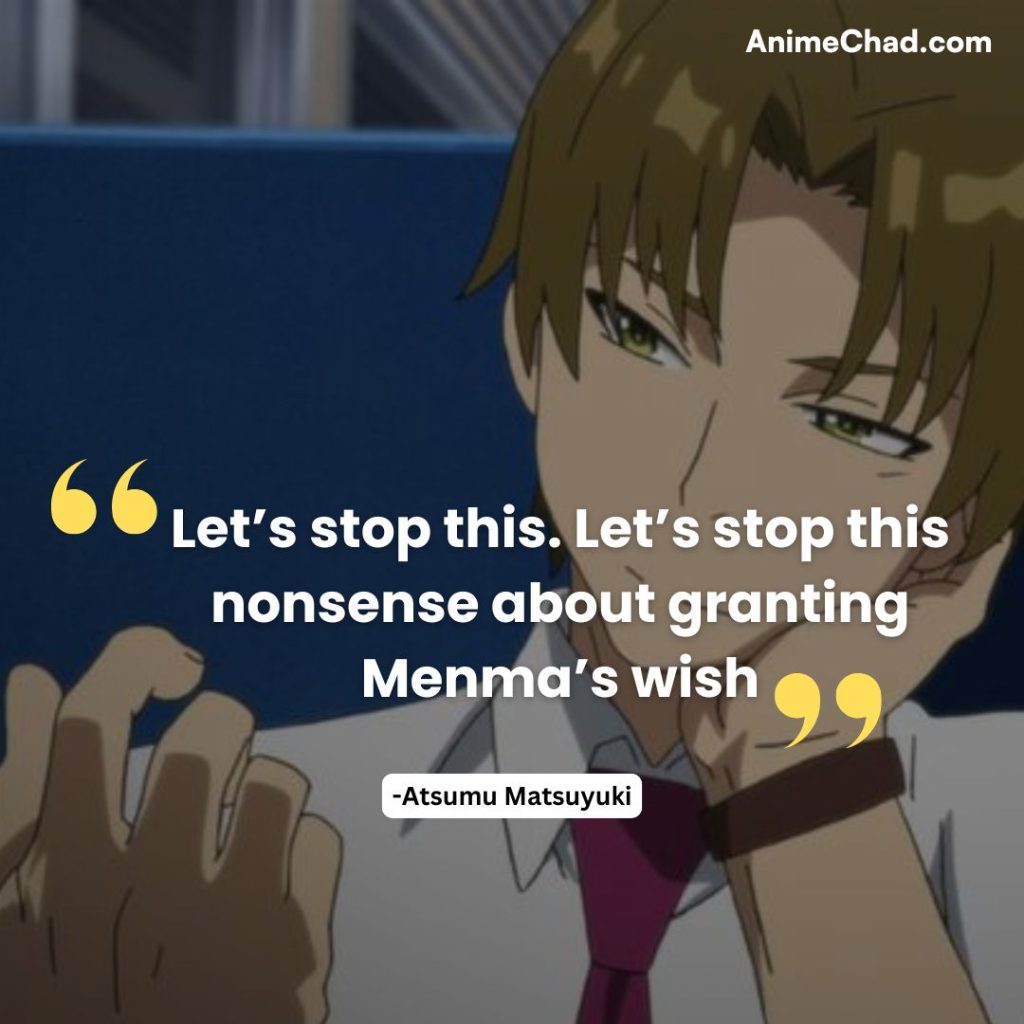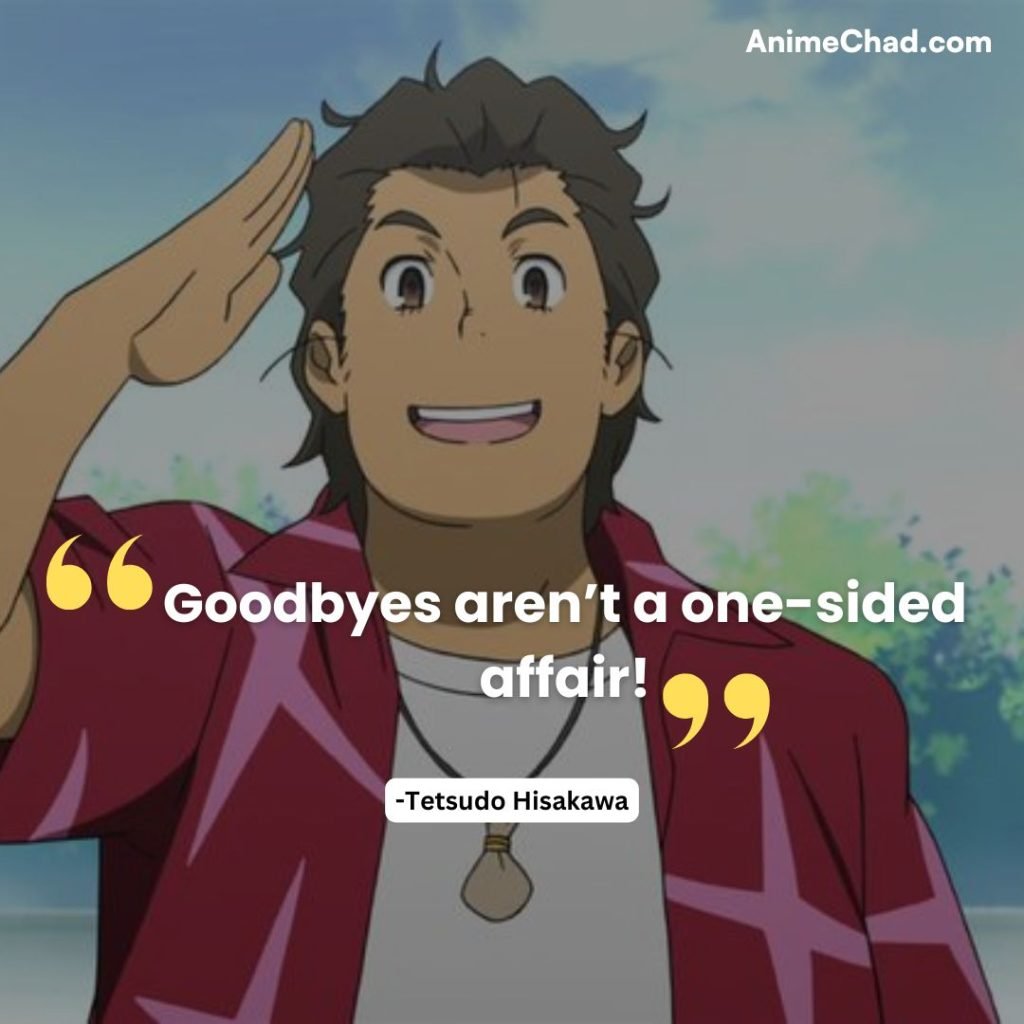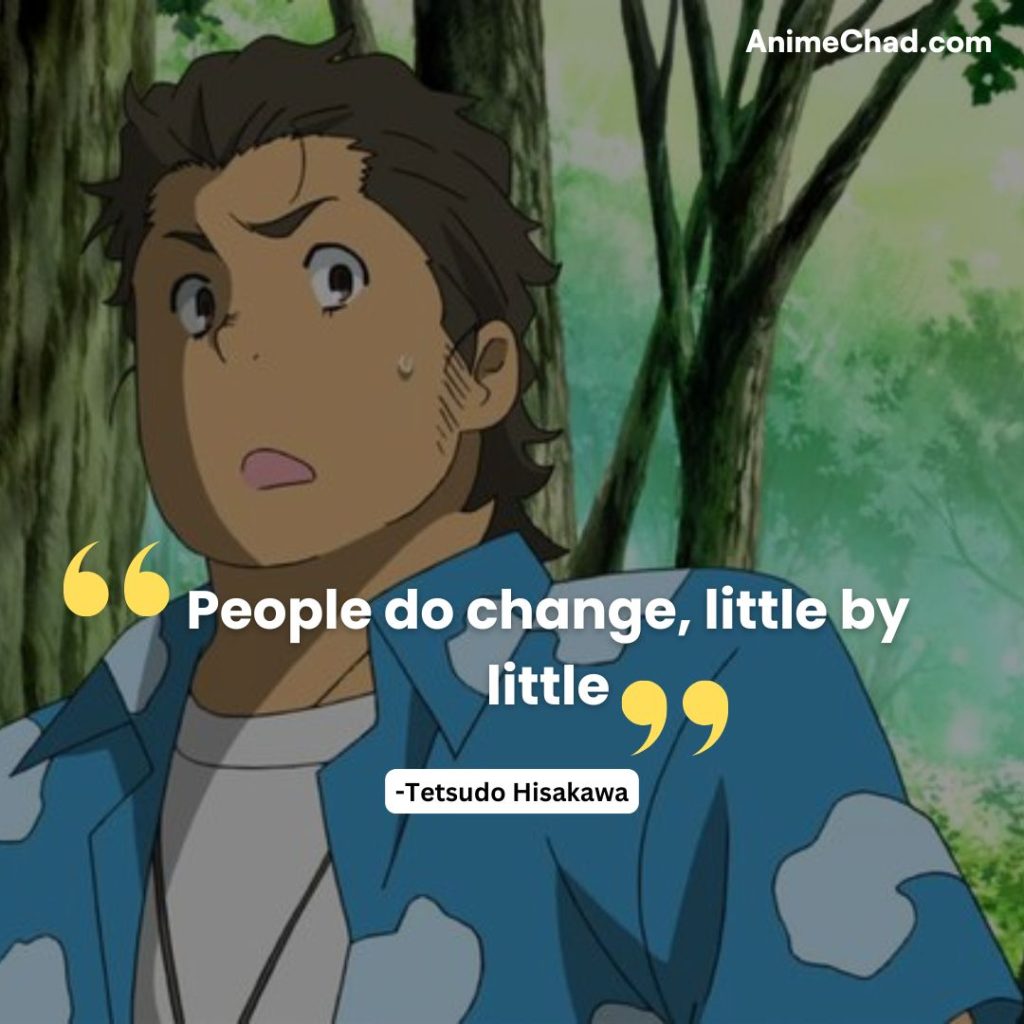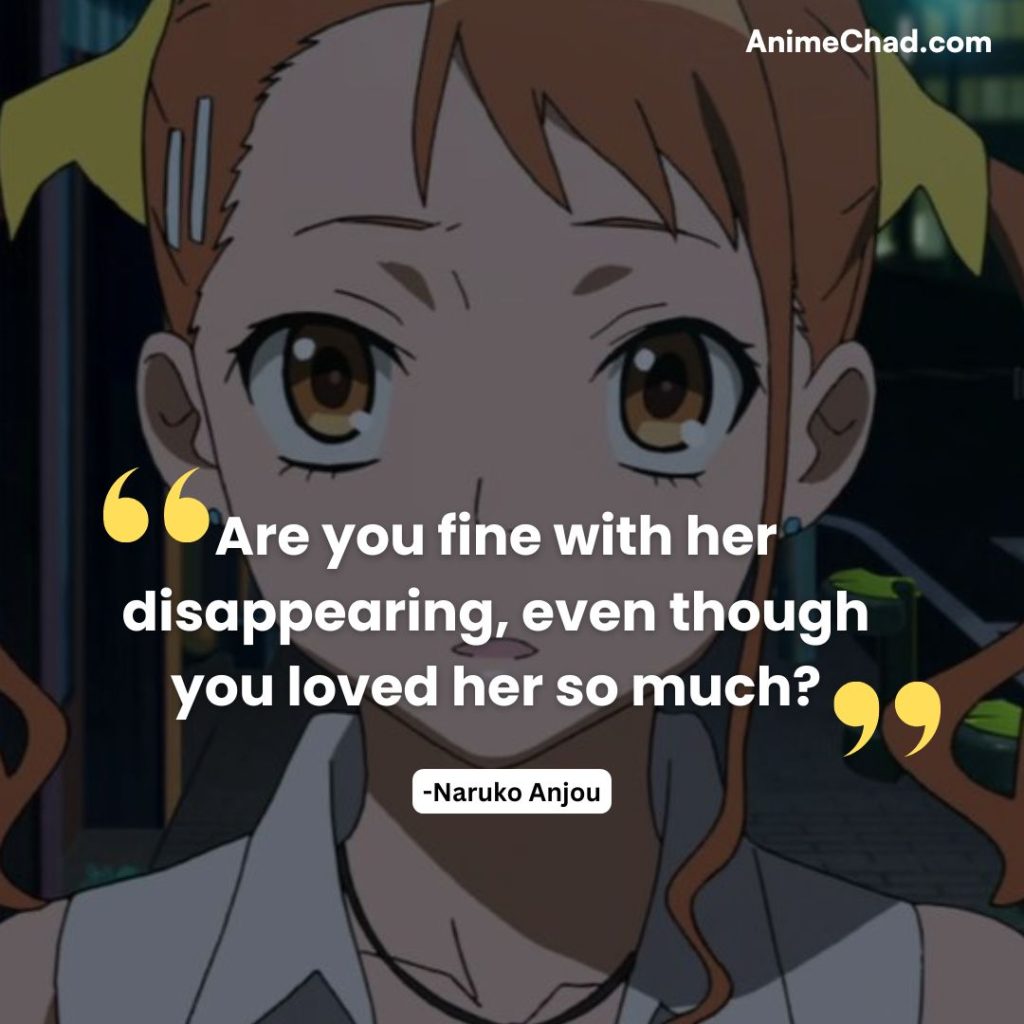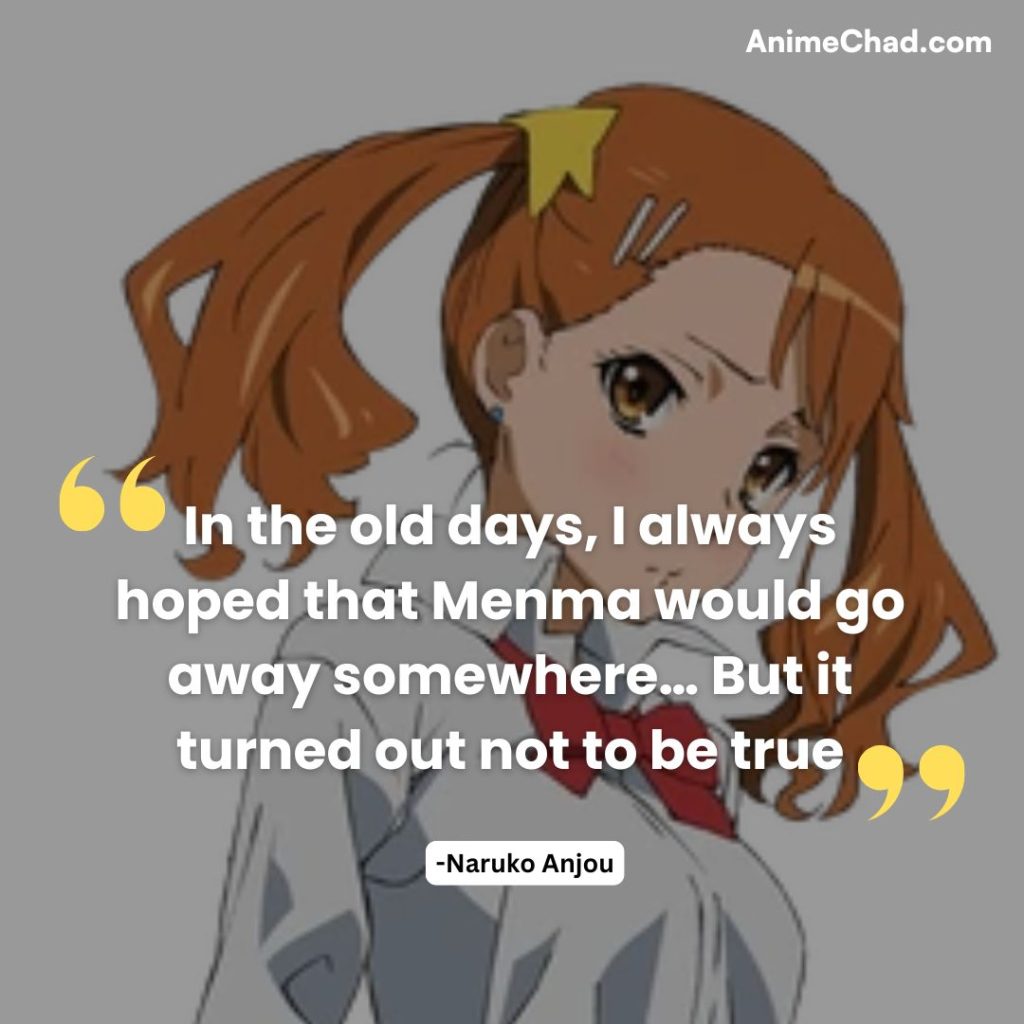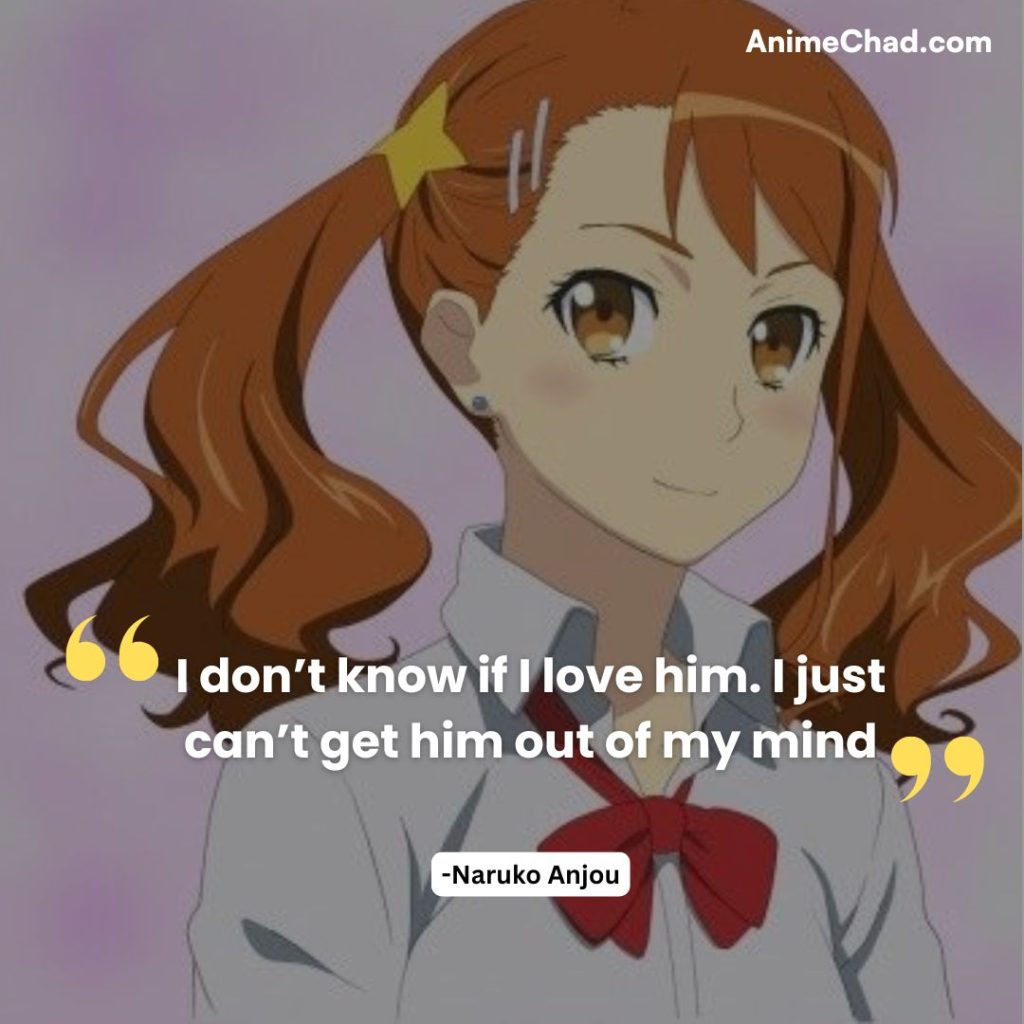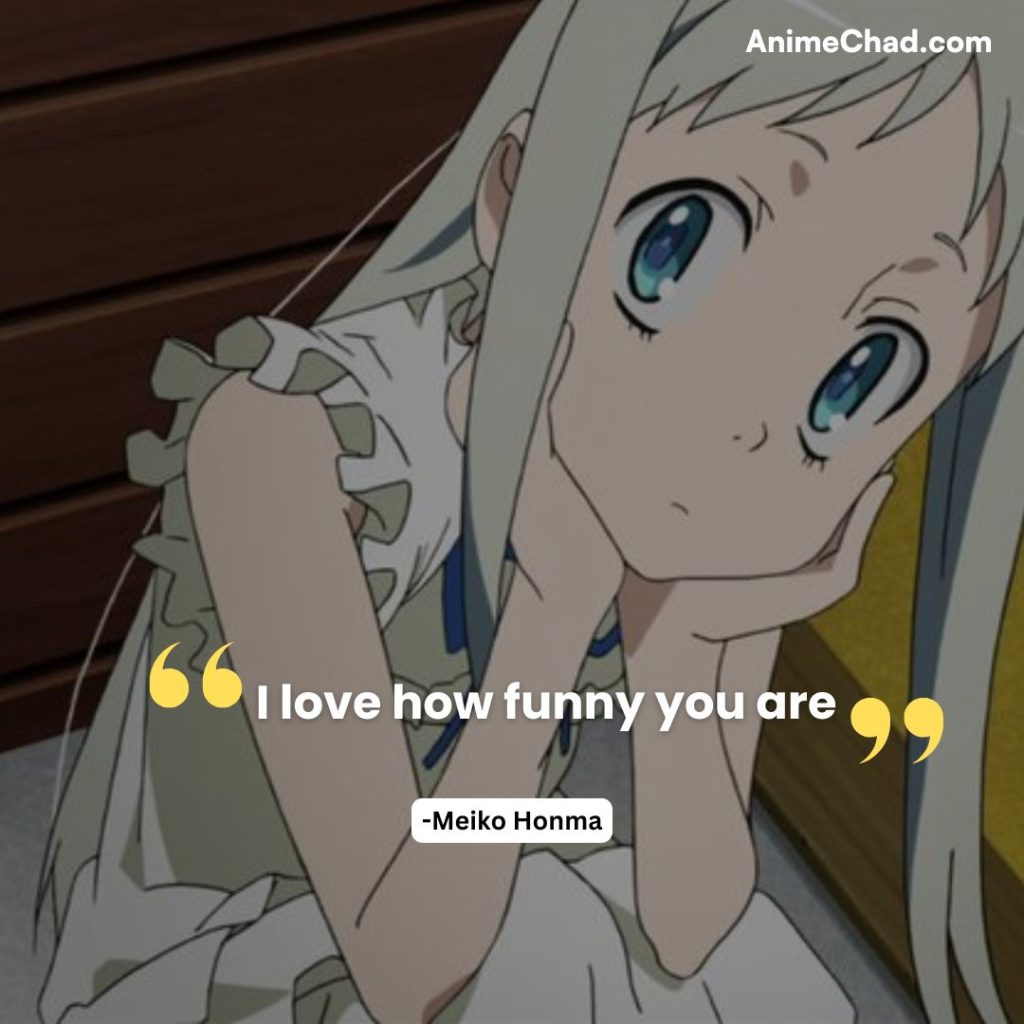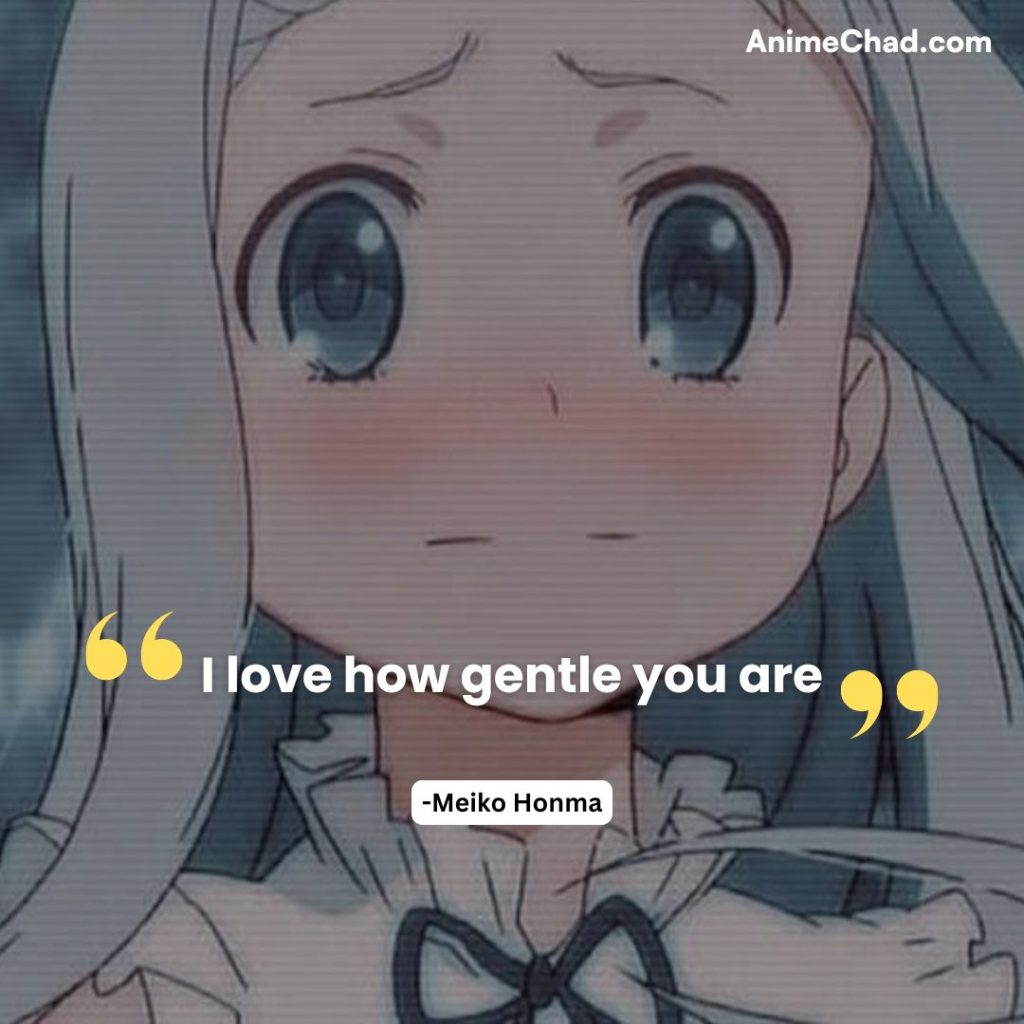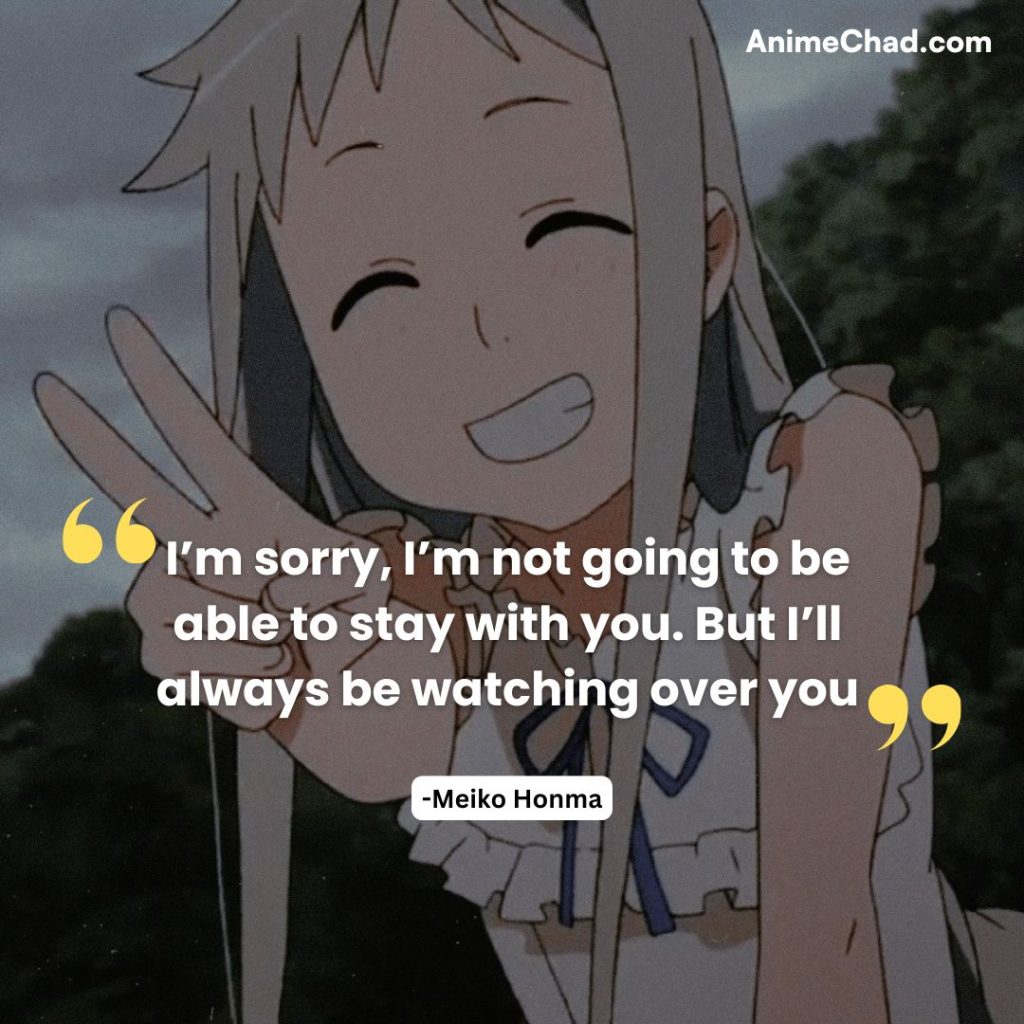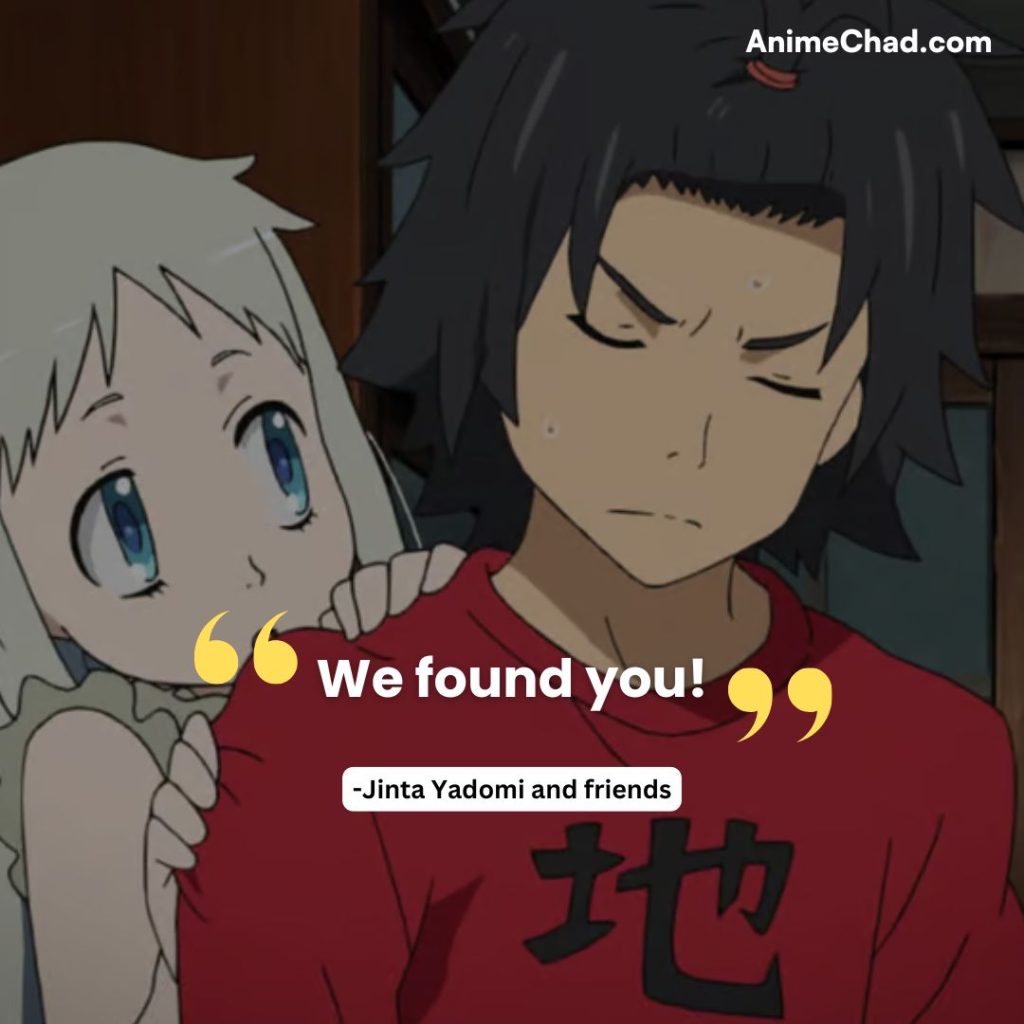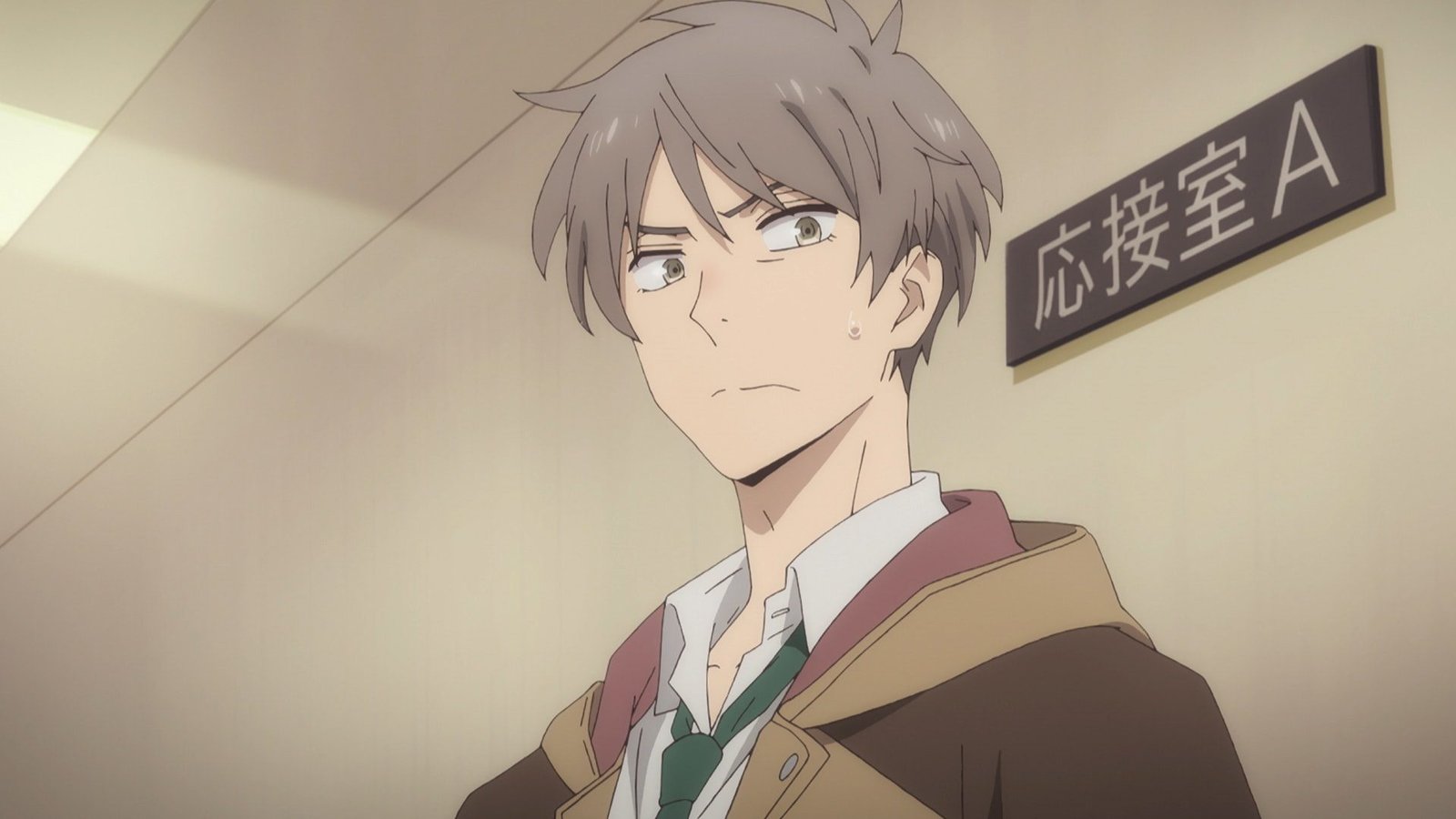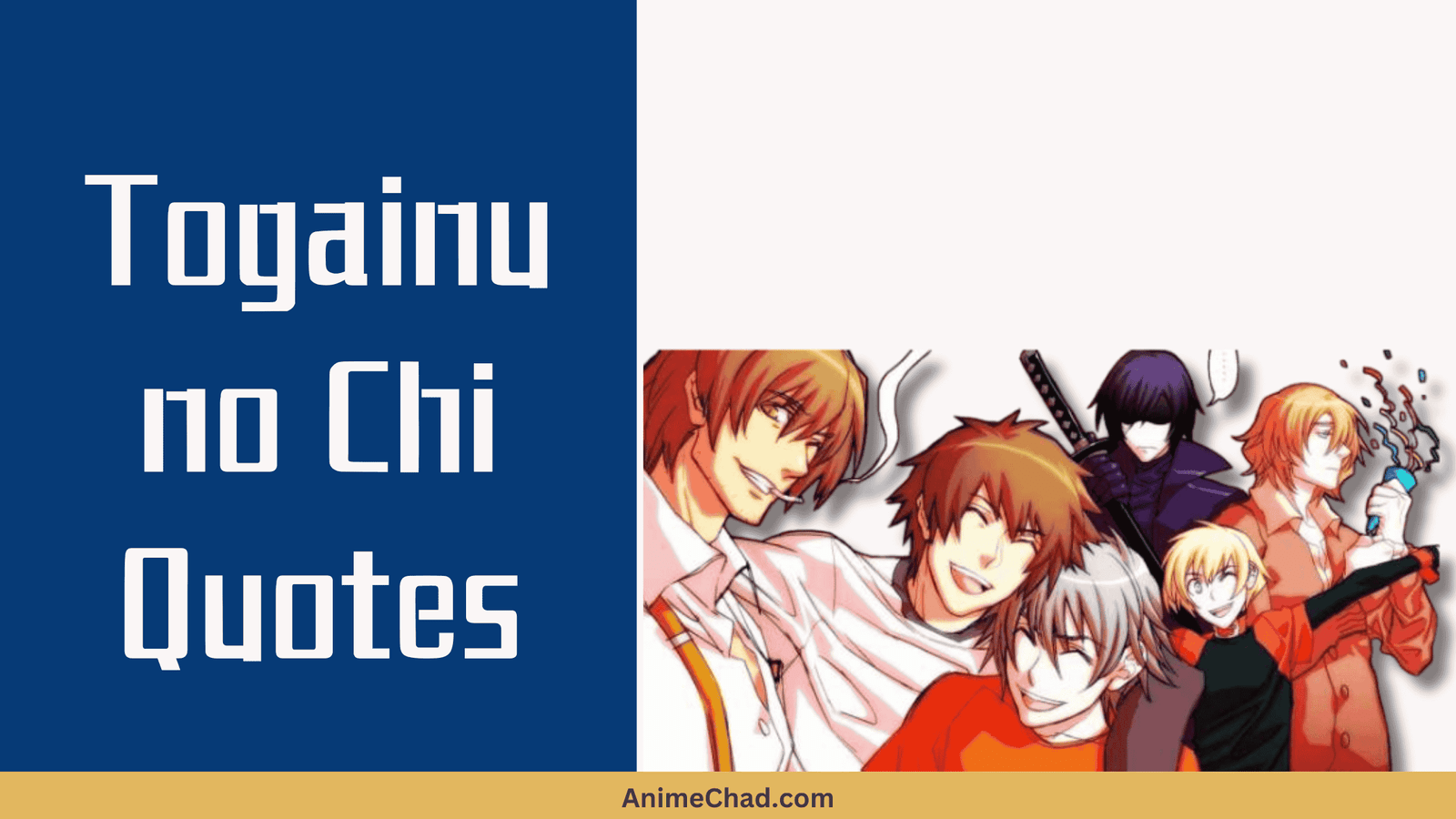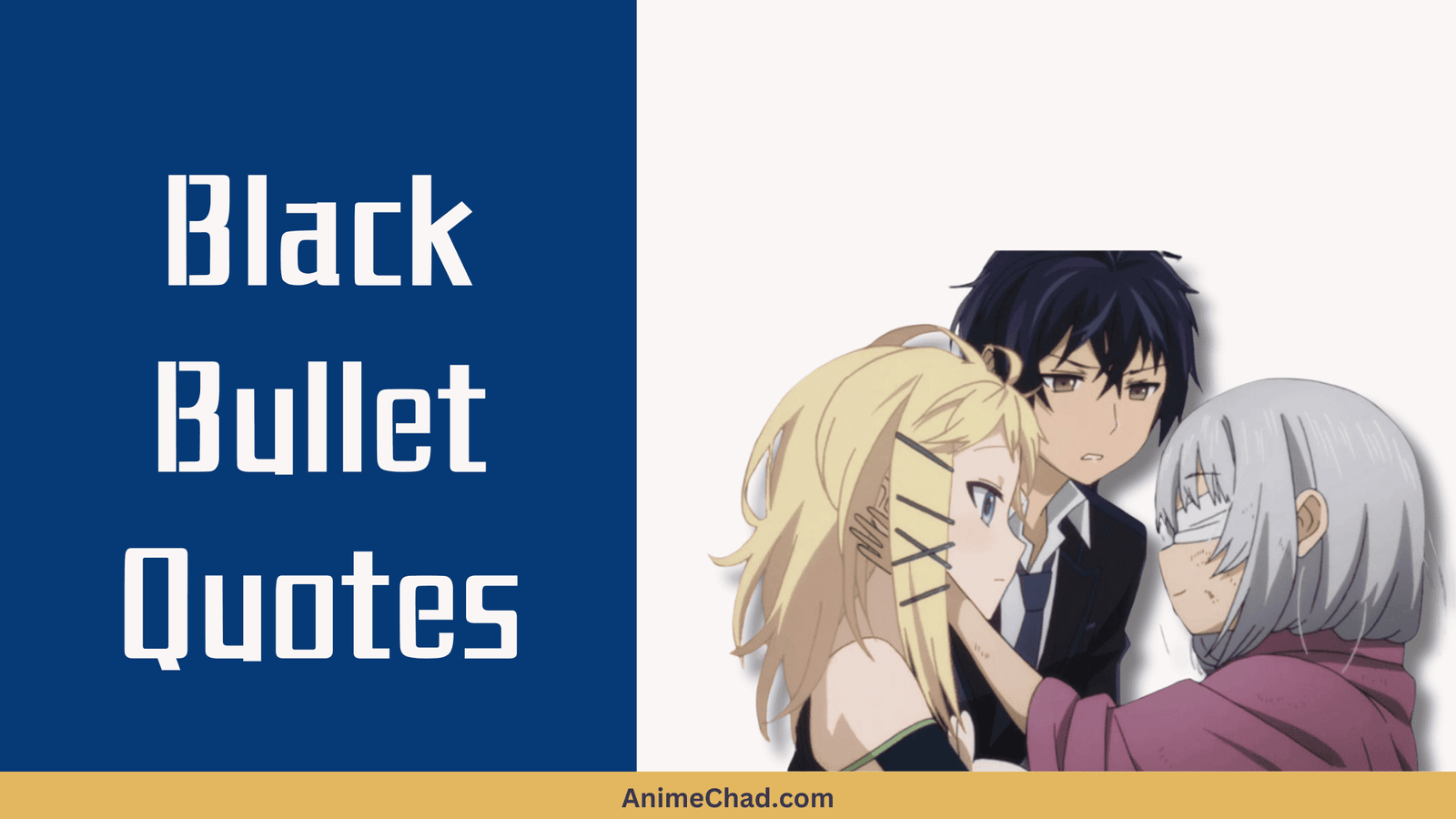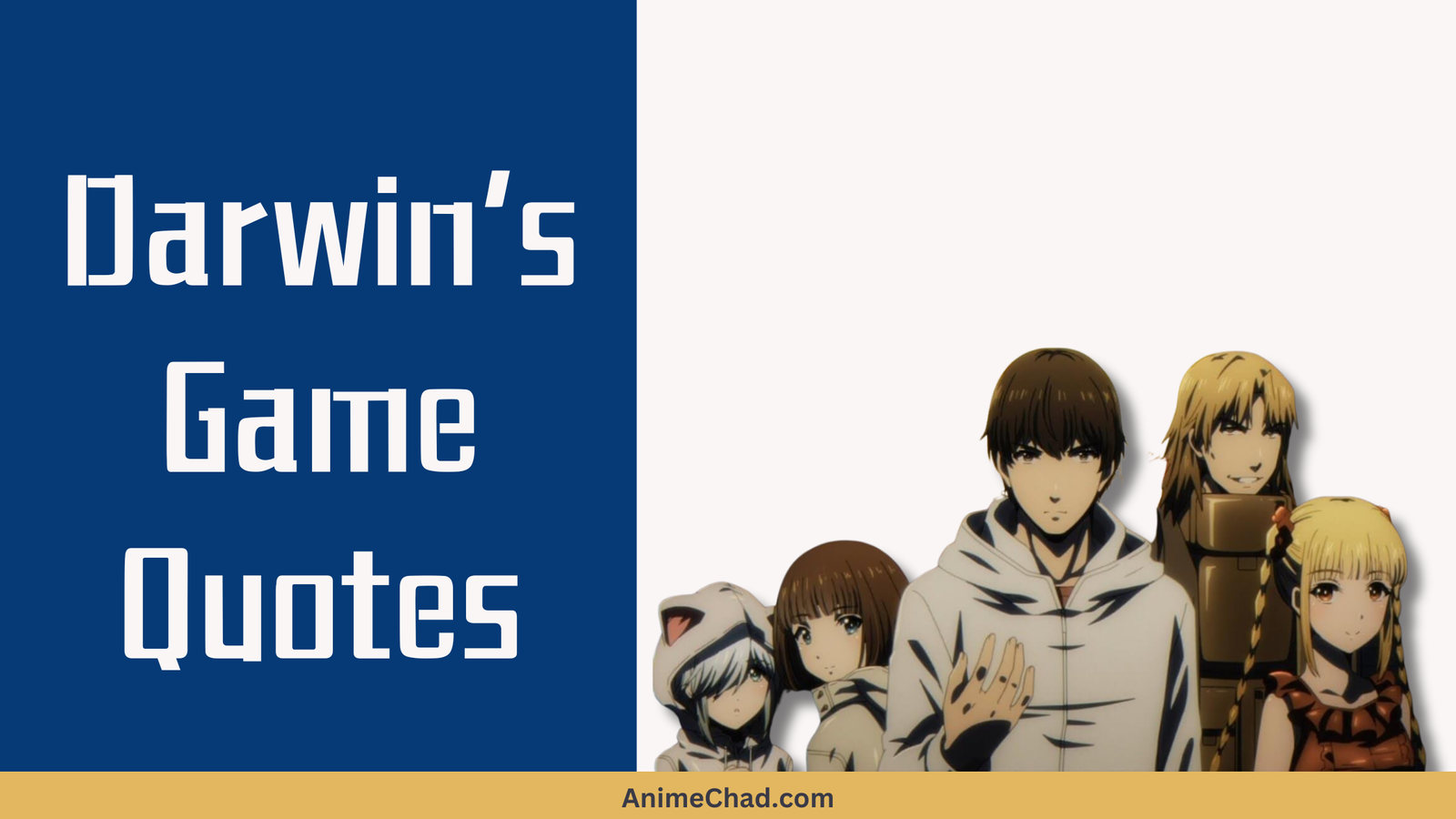Anohana: The Flower We Saw That Day tells the story of Jinta “Jintan” Yadomi and his childhood friends, who are brought back together by the ghost of their friend Meiko “Menma” Honma.
The series explores themes of grief, guilt, friendship, and the struggle to move on from loss.
This collection highlights the most memorable quotes, capturing the emotional depth and character growth that define Anohana’s enduring impact.
Thanks for everything today. Tomorrow I’ll go to heaven. Please be my friends until the end
(Episode 11: The Flower Blooming on That Summer)
Meiko Honma
Menma’s heartfelt farewell expresses her gratitude and longing for lasting friendship, marking the story’s emotional climax.
I don’t want you to die! Never ever!
(Episode 11: The Flower Blooming on That Summer)
Meiko Honma
Menma’s desperate plea reflects her innocence and the group’s pain over her loss, underscoring the tragedy at the series’ core.
Even if I’m dead I want everyone to get along!
(Episode 1: Super Peace Busters)
Meiko Honma
Menma’s wish for unity drives the group’s journey toward reconciliation and healing.
I really like it when you smile
(Episode 2: Menma the Hero)
Meiko Honma
A simple, sincere compliment from Menma that helps Jintan begin to open up again.
I love you, Jintan. It’s the “I want to marry you” type of I love you
(Episode 11: The Flower Blooming on That Summer)
Meiko Honma
Menma’s confession reveals her true feelings, bringing closure to Jintan’s guilt and regret.
Super Peace Busters are friends forever
(Episode 1: Super Peace Busters)
Meiko Honma
This childhood motto becomes a symbol of their enduring bond and hope for reconciliation.
I thought I could just apologize tomorrow. But that tomorrow… never came
(Episode 2: Menma the Hero)
Jinta Yadomi
Jintan’s regret over lost chances highlights the series’ message about acting before it’s too late1.
Everyone’s changed… That’s not it. The one who’s changed the most… is me
(Episode 3: Menma Search Party)
Jinta Yadomi
Jintan’s self-awareness marks the beginning of his journey toward growth and acceptance.
After losing Menma, her mother has held a grudge against us… Everyone is drowning in their own guilt
(Episode 5: Tunnel)
Jinta Yadomi
Jintan acknowledges the collective burden of grief and guilt that fractured their friendships.
I don’t care if you think I’m crazy or weird
(Episode 1: Super Peace Busters)
Jinta Yadomi
Jintan’s willingness to be misunderstood shows his commitment to helping Menma, regardless of others’ opinions.
If only I hadn’t said those words to Menma, then she wouldn’t have died
(Episode 6: Forget It, Don’t Forget)
Atsumu Matsuyuki
Yukiatsu’s confession reveals the deep regret and self-blame that haunt him.
Let’s stop this. Let’s stop this nonsense about granting Menma’s wish
(Episode 7: The Real Wish)
Atsumu Matsuyuki
Yukiatsu’s resistance reflects his struggle to accept the past and move forward.
Goodbyes aren’t a one-sided affair!
(Episode 10: Fireworks)
Tetsudo Hisakawa
Poppo’s realization emphasizes that closure requires effort and honesty from everyone involved.
People do change, little by little
(Episode 9: Menma and Company)
Tetsudo Hisakawa
Poppo’s insight acknowledges the subtle, ongoing process of healing and personal growth.
Are you fine with her disappearing, even though you loved her so much?
(Episode 10: Fireworks)
Naruko Anjou
Anaru voices the fear of letting go, exposing her vulnerability and unresolved feelings for both Menma and Jintan.
In the old days, I always hoped that Menma would go away somewhere… But it turned out not to be true
(Episode 7: The Real Wish)
Naruko Anjou
Anaru’s confession of jealousy and regret deepens her character and the complexity of their friendships.
I don’t know if I love him. I just can’t get him out of my mind
(Episode 8: I Wonder)
Naruko Anjou
Anaru’s uncertainty about her feelings for Jintan highlights the confusion and pain of growing up.
I love how you always work so hard
(Episode 11: The Flower Blooming on That Summer)
Meiko Honma (to Atsumu Matsuyuki, via letter)
Menma’s letter acknowledges Yukiatsu’s struggles and efforts, offering him the validation he longed for.
I love how funny you are
(Episode 11: The Flower Blooming on That Summer)
Meiko Honma (to Tetsudo Hisakawa, via letter)
Menma’s words to Poppo help him confront his guilt and remember the joy he brought to the group.
I love how gentle you are
(Episode 11: The Flower Blooming on That Summer)
Meiko Honma (to Chiriko Tsurumi, via letter)
Menma’s message reminds Tsuruko of her kindness, helping her accept herself.
I love how you’re always level-headed
(Episode 11: The Flower Blooming on That Summer)
Meiko Honma (to Naruko Anjou, via letter)
Menma’s letter helps Anaru reconcile her past and present selves, encouraging self-acceptance.
I’m sorry, I’m not going to be able to stay with you. But I’ll always be watching over you
(Episode 11: The Flower Blooming on That Summer)
Meiko Honma
Menma’s final goodbye brings closure and comfort, embodying the series’ themes of memory and moving on.
You found me
(Episode 11: The Flower Blooming on That Summer)
Meiko Honma
Menma’s response during the final game of hide-and-seek signifies the group’s emotional reunion and healing.
We found you!
(Episode 11: The Flower Blooming on That Summer)
Jinta Yadomi and friends
The group’s collective cry marks the moment they finally let go and accept Menma’s passing.
Super Peace Busters never say goodbye
(Episode 1: Super Peace Busters)
Meiko Honma
Their childhood vow echoes through the series, symbolizing lasting bonds and the difficulty of parting.
These quotes capture the heartache, hope, and growth at the center of Anohana, illustrating how friendship and honesty can lead to healing after loss.

